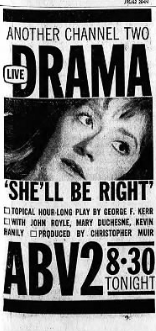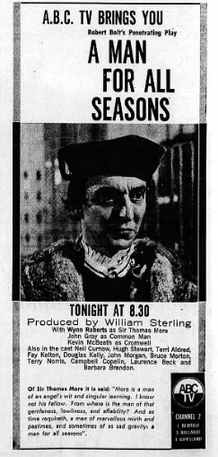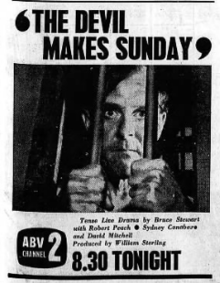Ending It was a 1939 BBC TV one-off play, written by Val Gielgud, and starring John Robinson, Joan Marion, and Dino Galvani. It was 30 minutes in duration. It was broadcast live on 25 August 1939.
Roundabout is a television movie, or rather a live television play, which aired on Australian television in 1957. Broadcast 4 January 1957 on ABC station ABV-2, it is notable as the first example of television drama produced in Melbourne.

Uneasy Paradise is a 1963 Australian television film directed by William Sterling. It is a 60-minute drama set in Melbourne about a gambler married to Sally. He loses much money at a club run by Paolo.
The Case of Private Hamp is a 1962 Australian television film which aired on the ABC. Despite the wiping of the era, a copy of the presentation exists as a kinescope recording.

The Sound of Thunder is a 1957 Australian television play by Australian writer Iain MacCormick. It starred Moira Carleton. It was described as "the longest and most ambitious play ABN [the ABC] has put over so far" although The Importance of Being Ernest, which followed on December 18, exceeded it by 12 minutes.
Outpost is a 1959 Australian television play about Australian soldiers in New Guinea during World War Two. It was written for television by John Cameron.

She'll Be Right is a 1962 Australian television play which aired on the ABC.
Eye of the Night is a 1960 Australian television play. It was written by Kay Keavney and directed by Christopher Muir.
Everyman is a 1964 Australian television play. It screened on the ABC and was directed by Christopher Muir, who filmed the whole script.
Wild Life and Christmas Belles is a 1958 Australian television revue. It was shown on New Year's Eve, running from 10:55 pm until a few minutes before midnight. It was filmed in ABC's Melbourne studios but was shown in Sydney and Melbourne simultaneously. The cast included Barry Humphries, who played Mrs Norma Everage. The sketch had Mrs Everage enter a special model school for the "Lovely Mother" quest.
Who Killed Kovali? is a 1960 Australian television play. It had previously been filmed for British TV in 1957.

Light Me a Lucifer is a 1962 Australian television comedy film which aired on ABC. Written by John O'Grady, it starred Frank Thring as the devil, along with Wyn Roberts, Edward Howell, Joan Harris, Ken Goodlet and Lynne Flanagan. It was produced in Melbourne.
The Devil Makes Sunday is a television play about a convict break out on Norfolk Island by Bruce Stewart, who had just written Shadow of a Pale Horse. It was based on the real life Norfolk Island convict mutinies.

A Man for All Seasons is a 1964 Australian television play. It is an adaptation of the play by Robert Bolt.

The Prisoner is a 1962 Australian television play based on a play which had been filmed with Alec Guinness. Many Australian TV dramas at the time were based on overseas stories.
The End Begins is a 1961 Australian television play shot in ABC's Melbourne studios. Like many early Australian TV plays it was based on an overseas script. It was a rare Australian TV play with a science fiction theme and a black lead actor, although no recordings are thought to have survived.

You Can't Win 'Em All is a 1962 Australian television play directed by Patrick Barton. Filmed in London, it was based on a play by Alun Owen which had been previously filmed by the BBC in 1962.
"Romeo and Juliet" is a 1967 Australian TV play based on the play by William Shakespeare. It was presented as part of the Love and War anthology series on the ABC.
Sydney Leicester Conabere was an Australian actor. He was notable for his work in theatre, film and television drama in a career spanning more than fifty years. In 1962 Conabere won the Logie award for Best Actor, for his performance in the television play The One Day of the Year. He worked prolifically as a stage actor from 1938 to 1989, particularly with the Melbourne Theatre Company and Melbourne Little Theatre, sharing the stage with Irene Mitchell in, for example, Lilian Hellman's The Little Foxes.
Ned Kelly is a 1959 Australian television play adapted from the radio play of the same name.







